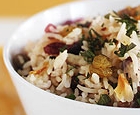|
Turkish Side Classic Rice Pilaf You've probably had many pilafs over the years, but this one's a winner—cinnamon, currants and a little tomato paste. Then add dill.
Soak Rice: in a large bowl, pour 5 C warm water and add 1 tsp. salt, stirring to dissolve. Let stand till rice is cool. Drain well. Cook Pilaf: Sauté onions in a large pan till soft, add soaked rice, and sauté till rice is transparent. Add beef broth and remaining ingredients, except dill. Cover and simmer gently 20-25 till rice is tender. (If you need more moisture, add a tablespoon of water or broth). Mix in dill and serve immediately. |
Tips & Glossary You may not have all the ingredients used in Turkish cooking on your spice shelf, but you'll find them at Middle-East food stores. To avoid frustration, make a list of items you need before trying out the recipes. Cumin: an aromatic, kin to parsley and carrots; an important ingredient in chili powder. Used especially in Indian curries, as well as in Mid-Eastern, Mexican, and Asian dishes. It has an earthy, peppery flavor. Filo: aka phyllo, paper-thin sheets of raw, unleavened flour dough. Buy frozen in any grocery store and follow directions on package for thawing. When working with one sheet, keep others covered with a damp towel to prevent drying out. Peeled Tomatoes: choose 1 of 2 methods: 1) hold tomatoes one-at-a-time over gas flame till skin bubbles and becomes charred; 2) drop all tomatoes into pot of boiling water for 45 seconds. After either method, run tomatoes under running water; skins will slip off easily. Roasted peppers: buy them prepared. Or make your own: place peppers under a broiler, or hold over a gas flame, till skin chars and blisters. Place them in a closed paper bag for 15-20 minutes (to steam them). When cool enough to handle, the skins slip off under running water. Rosewater: distilled from rose petals and used to flavor Mid-Eastern and Asian cooking. You can make your own—but why? Purchase it at Mid-East or Asian or food stores. Saffron: the most expensive spice in the world, from the crocus plant, and cultivated in Iran and Spain. Along with its unusual taste, it adds a deep rich yellow color to food. Use a strand or two at a time and soak in warm water before using. Skewers: use metal or wooden skewers for kabobs. If wooden, be sure to soak them for 30 minutes before using to prevent them from catching on fire.
|
Site by BOOM
![]()
LitLovers © 2024

